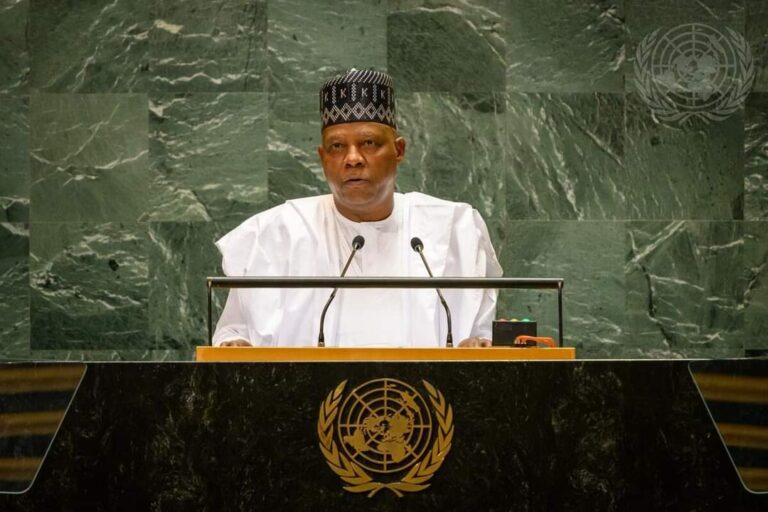- Safiu Kehinde
President Bola Ahmed Tinubu has expressed concern over Africa’s debt burden and its impact on governance of African countries.
Tinubu made this known on Tuesday at the ongoing General Debate of the 79th United Nations General Assembly in New York.
Represented by Vice President, Kashim Shettima, Tinubu harped on the need to provide debt relief for African countries as he noted that debt burden undermines the capacity of countries and government to meet the needs of their citizens.
“The global debt burden undermines the capacity of countries and governments to meet the needs of their citizens.
“Creeping trade barriers and protectionist policies are destroying the hopes for prosperity of peoples and nations. Unbridled competition rather than cooperation is discouraging incentives and driving away investments.
“We must ensure that any reform of the international financial system includes comprehensive debt relief measures, to enable sustainable financing for development. Countries of the global South cannot make meaningful economic progress without special concessions and a review of their current debt burden.” Tinubu said.
While commending the UN Secretary-General, Antonio Guterres, the Nigerian President called for more work to be done to bridge the gap between aspirations and realities confronting the world today.
He advocated for multilateralism stressing that the UN’s tripod of peace, sustainable development, and human rights, are under threat as nations now make selfish pursuits rather than collective needs for global growth.
“The theme of this year’s General Assembly leaves us in no doubt that there is still work to be done to bridge the gap between aspirations and the realities confronting our world today.
“It also underscores the need to remind ourselves that the United Nations stands for inclusiveness – anchored on the tripod of peace, sustainable development and human rights.
“Today, these pillars of our organisation are threatened. They risk being broken by the relentless pursuit of individual national priorities rather than the collective needs of the nations that are assembled here today.
“While commitment to multilateralism offers us the surest guarantee of global action to address the existential challenges we face, singularity and nationalism are undermining the aspirations towards the peaceful and collective resolution of such challenges.” Tinubu said.
Tinubu also expressed concern over some socio-political challenges as it affects the world and Africa at large.
Speaking on Africa, Tinubu condemned the rein of military rule in the continent especially in West Africa which he claimed should be focal point of discourse at the 79th UN General Assembly.
“However, the return of unconstitutional changes of government and forceful military take overs in some countries of the Sahel underscore the fragility of democracy when it is not backed by economic development and sustained peace and security.
“It is this fragility, rather than the milestones that democratic governance has achieved in Africa, that should matter most in our deliberations at this and other High-Level Segments of the 79th Session of the General Assembly.
“While we abhor all forceful changes of government, we can also recognise the impatience in cities and villages at the sometimes slow and grinding turn of the wheel of democracy.” He said.
In the same vein, he lamented on the spate of conflicts across the world with reference to Israel-Gaza war and Sudan crisis amongst others.
“Conflict prevention is the main reason why the UN exists. But the task of prevention becomes all the more difficult when conflict becomes normalised, when even the condemnation of violence and civilian casualties, and calls for a ceasefire, are somehow regarded as controversial.
“As we emphasised at the Abuja High-Level Ministerial meeting, we must renew our focus on conflict prevention.
“Indeed, addressing the root causes of conflicts is often the first step towards providing long-term solutions. Clearly, some of the root causes of conflicts are social in nature, including poverty, hunger, ignorance, inequality and exclusion, as well as other forms of injustice.
“In Sudan, other parts of our continent and further afield, foreign actors are exacerbating those tensions to prolong conflict and deepen the suffering of innocent people.
“Today, we are all witnesses to the heart-wrenching situation in Gaza and other Palestinian Territories.
“We cannot discuss war and peace, conflicts and reconciliation or humanitarian imperatives today without reflecting on the Israeli-Palestinian conflict that has been raging since 7th October last year.
“Of course, the conflict predates this period and has been simmering for a better part of half a century. What this tells us is that the international community has failed to live up to the spirit and aspirations of the United Nations to rid the world of inequality, violence and domination of one people by another. Justice is antithetical to revenge.” Tinubu stated.
Meanwhile, he called for the independence of Palestine while expressing Nigeria’s commitment to peacekeeping.
“Freedom is an inalienable right and a natural entitlement that cannot be denied to any people.
“The Palestinian people deserve their independence. They deserve to have a home of their own on territories already recognised by this very Assembly and by international law, which is being routinely ignored.
“Nigeria continues to urge efforts to bring back on track the ‘two state solution’ that offers the prospect for a new beginning for the region.
“Nigeria reaffirms its commitment to supporting United Nations Peacekeeping Operations. We recognise the need for Africa to build strong and professional armies to meet the multiple challenges we face.
“Consequently, we reiterate the call for international support to operationalise the African Standby Force, in addition to the provision of requisite support and resources to ensure the upgrade, take-off and effectiveness of a Centre of Excellence on issues of counter-terrorism in Africa” Tinubu added.


